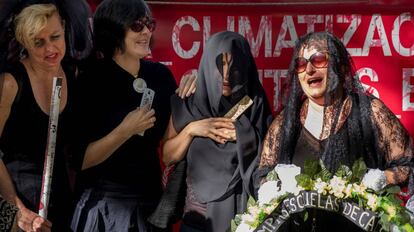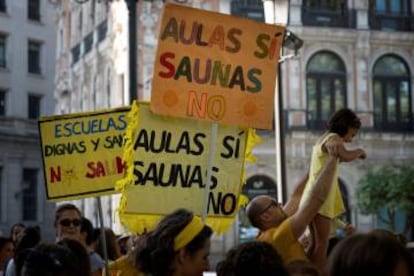Spanish students demand action to stop sweltering conditions in classrooms
Children are suffering nosebleeds and collapsing due to the lack of air conditioning in schools in the south of Spain


¡°All the kids in my class have had a nosebleed except me. It¡¯s really, really hot,¡± explains 10-year-old Macarena Galiano. She is one of the students at Manuel Siurot School in Seville who has had to endure the recent sweltering 34?C temperatures inside a classroom with no air conditioning.
On Sunday, she took part in a protest called by the organization Escuelas de Calor (Hot Schools) to support a ¡°bioclimate¡± law that would improve conditions in schools in Spain¡¯s southern Andalusia region by enhancing them with special thermal and energy designs. The demonstrators held a fake funeral to illustrate that the bill, which is currently making its way through the regional parliament, could be axed if early elections are called and parliament dissolved.
Excess heat makes concentration enormously difficult and leads to physical tiredness
Antonio Gonz¨¢lez-Meneses, pediatrician
Students in Seville, C¨®rdoba, Ja¨¦n and Huelva are suffering from fainting spells and nosebleeds as a result of the poorly-ventilated classrooms. Last week, three students collapsed and one teacher was sent to hospital because of the heat.
The movement to improve air conditioning in schools began a year and a half ago when Spain was hit by a brutal heat wave. At the time, the regional health minister of Madrid, Jes¨²s S¨¢nchez recommended that students make ¡°paper fans,¡± while parents in Andalusia demanded urgent action to stop the constant fainting spells.
Since the spring of 2017, the government of Andalusia has undertaken 256 projects but there are 6,000 buildings in primary, secondary and university schools in need of air conditioning. ¡°At this rate, it will take more than 40 years for the centers to be air conditioned,¡± said Marina Jim¨¦nez, the spokesperson of the Escuelas de Calor platform.

¡°Some parent associations have collected money to pay for air conditioning for their children, but under irregular conditions. But we reject this co-payment because it generates inequality,¡± she added.
With the exception of the ruling Socialist Party (PSOE), all political groups in the Andalusian regional parliament support the pioneering bill to create bioclimatic schools better adapted to the local weather.
At the demonstration on Sunday, protesters waved posters with messages like ¡°Yes to classrooms! No to saunas!¡± and ¡° We want to study not to sweat!¡±
Rosario Hern¨¢ndez, from the platform Girls from the South in C¨®rdoba, complained that parents had raised €12,000 to install air conditioning ¡°but the school board stopped us from installing it because they worried they would get into trouble over the electricity bill.¡±
¡°My son has already had his first asthma outbreak because of the high temperatures, and he even has air conditioning in his classroom,¡± she added.
All the kids in my class have had a nosebleed except me. It¡¯s really, really hot
Macarena Galiano, 10
Juan Manuel L¨®pez, the head of Andalusia¡¯s Public Education Agency, has defended the administration of Susana D¨ªaz, claiming it has been introducing measures to achieve ¡°comfortable¡± classroom temperatures since 2003.
¡°The response to the heat can¡¯t be 125,000 air conditioning units,¡± he said. ¡°We have to follow the experts¡¯ advice.¡±
Students in schools across Seville and Huelva will go on strike on Wednesday to protest the sweltering conditions. ¡°It¡¯s impossible to give a class normally and there is no sign that there will be measures to protect our health,¡± says Ainoa Murcia, secretary general of the student union in Seville. According to the teachers union Ustea, 99% of schools do not have air conditioning.
The proposed law to improve classroom conditions comes in response to the rising temperatures and increasingly long summers in Andalusia. ¡°Most of the public buildings used for education in Andalusia were built with less rigorous criteria,¡± the law argues.
The law is backed by all political groups except for the ruling PSOE which told EL PA?S via email that the proposal was ¡°opportunistic.¡±
According to the Royal Decree 486 approved in 1997, the temperature within a classroom must be between 14?C and 27?C, the same maximum recommended by the Institute of Workplace Safety and Hygiene.
But in Seville, temperatures are expected to rise to 33?C and last week they hit maximums of 34?C. This can have a dramatic effect on a child¡¯s learning ability, says pediatrician Antonio Gonz¨¢lez-Meneses from the Virgen del Roc¨ªo Hospital in Seville. ¡°Excess heat makes concentration enormously difficult and leads to physical tiredness. Care must be taken because there are schoolyards without shade and children can suffer from heat stroke and collapse.¡±
English version by Melissa Kitson.
Tu suscripci¨®n se est¨¢ usando en otro dispositivo
?Quieres a?adir otro usuario a tu suscripci¨®n?
Si contin¨²as leyendo en este dispositivo, no se podr¨¢ leer en el otro.
FlechaTu suscripci¨®n se est¨¢ usando en otro dispositivo y solo puedes acceder a EL PA?S desde un dispositivo a la vez.
Si quieres compartir tu cuenta, cambia tu suscripci¨®n a la modalidad Premium, as¨ª podr¨¢s a?adir otro usuario. Cada uno acceder¨¢ con su propia cuenta de email, lo que os permitir¨¢ personalizar vuestra experiencia en EL PA?S.
?Tienes una suscripci¨®n de empresa? Accede aqu¨ª para contratar m¨¢s cuentas.
En el caso de no saber qui¨¦n est¨¢ usando tu cuenta, te recomendamos cambiar tu contrase?a aqu¨ª.
Si decides continuar compartiendo tu cuenta, este mensaje se mostrar¨¢ en tu dispositivo y en el de la otra persona que est¨¢ usando tu cuenta de forma indefinida, afectando a tu experiencia de lectura. Puedes consultar aqu¨ª los t¨¦rminos y condiciones de la suscripci¨®n digital.










































